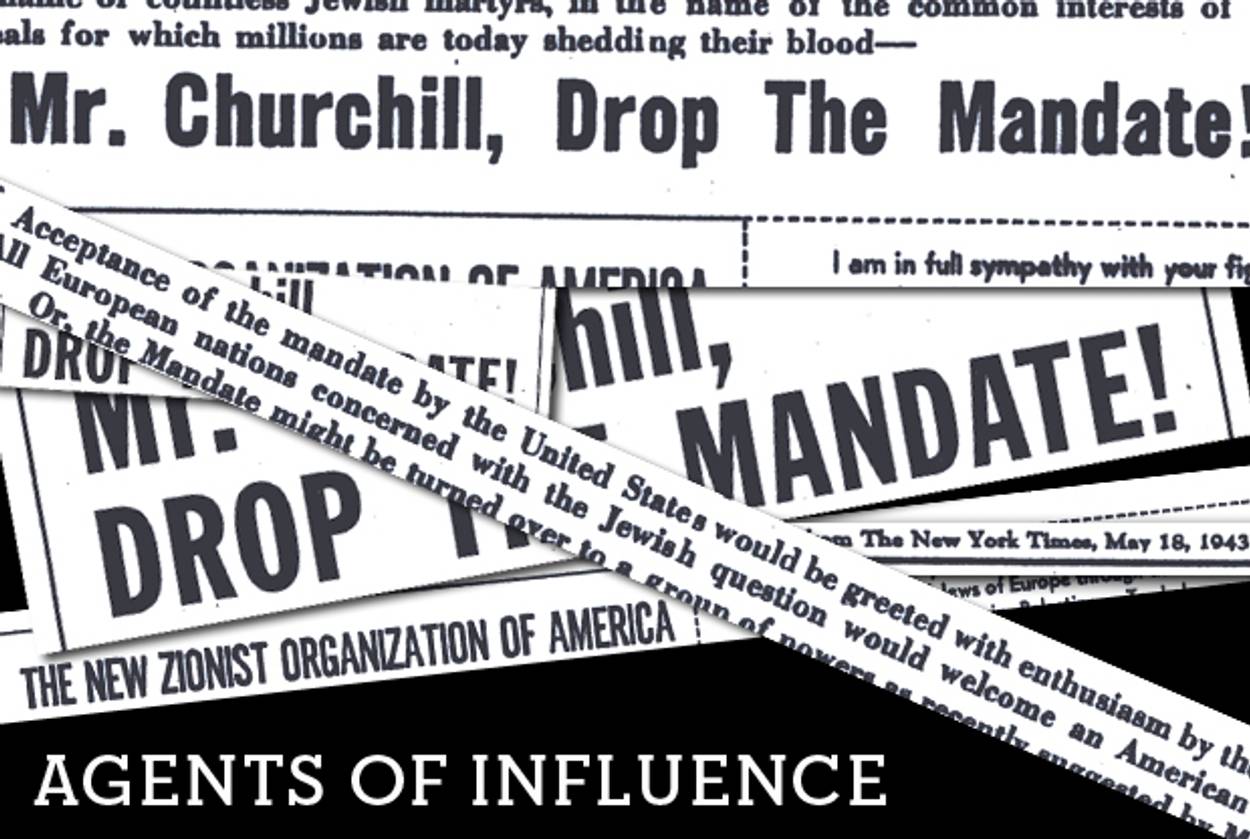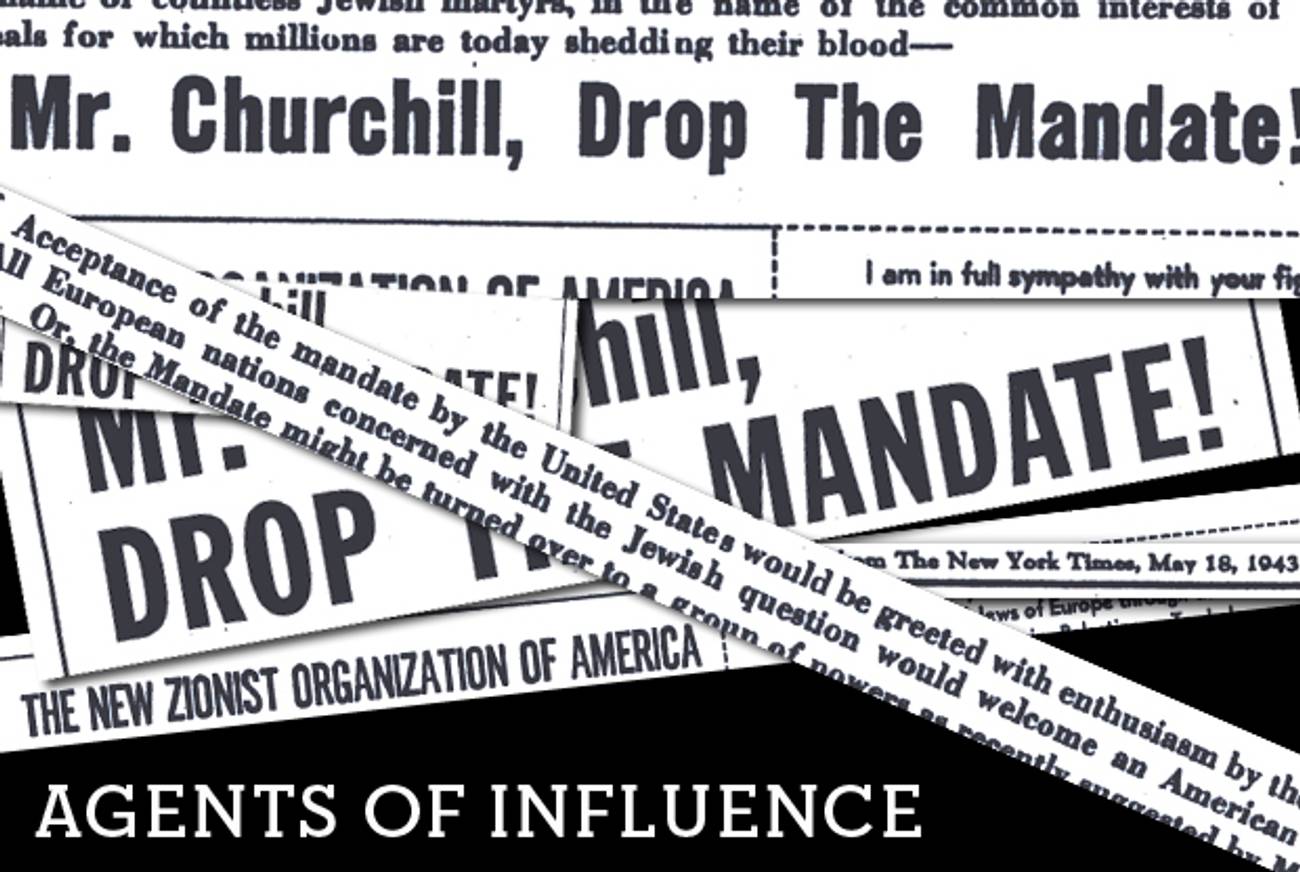The Israel Lobby’s GOP Past
Jewish voters are a reliable Democratic bloc. But the Republican Party established the first platform on Israel—and brought the Democrats along.




The influence of the late Benzion Netanyahu over his son Benjamin, the prime minister of Israel, is perhaps the most over-discussed Oedipal theme in the psycho-history of international affairs. But as it turns out, the late Netanyahu’s political influence seems to extend much further than his immediate heirs. According to a new book, Herbert Hoover and the Jews: The Origins of the “Jewish Vote” and Bipartisan Support for Israel, by Sonja Schoepf Wentling and Rafael Medoff, the scholar who is now being remembered for writing one of the 20th-century’s most significant works of history was also a practical man of political action who helped pioneer Washington’s Jewish lobby.
In the early 1940s, Benzion Netanyahu met with members of Congress and other political players to solicit American support for Jewish causes, including the creation of a Jewish state. He became such an important figure on Capitol Hill that in helping to draft the Republican political platform in the 1944 presidential campaign, he forced the other party—the one led by FDR—to match it and thereby created a bipartisan consensus on what was at the time called the “Palestine issue.”
“He had meetings with Hoover, Robert Taft, Claire Boothe Luce, Alf Landon,” said co-author Rafael Medoff. But Netanyahu’s reasons for reaching out to GOP figures had little to do with strict ideological alignment. Mainstream Jewish leaders who had built up close relations with Roosevelt avoided cultivating relationships with the president’s political rivals out of loyalty, sympathy for his domestic policies, and in many cases disdain for the Republicans. Netanyahu made no bones about targeting the Republicans. To him, it made obvious political sense. “The key element of Netanyahu’s political strategy was to form relationships on both sides of the aisle,” Medoff told me. “It’s conventional wisdom to do it now, but it wasn’t back then.”
Netanyahu arrived in Washington in 1940 as part of an entourage headed by Ze’ev Jabotinsky, who would die in August of that year in New York. The Revisionist Zionist leader had come to the United States to promote the idea of a Jewish military unit that would fight alongside the allies, as the Jewish Legion he inspired did during World War I, and to plead for the rescue of European Jews from the Nazis and for the establishment of a Jewish state in Palestine.
The Revisionists feared that the Roosevelt Administration felt no sense of urgency in addressing their issues—and worse, that the Jewish leaders who controlled access to the White House were loath to pressure the president. Mainstream American Jewish leaders like Rabbi Stephen Wise had built close relationships with FDR’s White House and didn’t want to damage their standing with a man who, by 1940, had already been president for eight years. And so rather than pressure the president, they effectively insulated him from criticism.
For instance, according to Herbert Hoover and the Jews, when British Prime Minister Winston Churchill visited the United States in 1943, the New Zionist Organization of America—the American wing of the Revisionist movement, where Netanyahu was executive director—ran a full-page ad in the New York Times demanding that “since the British had failed to fulfill the Balfour Declaration’s promise to facilitate creation of a Jewish national home, they should surrender their mandate over Palestine.” Wise and others, according to Medoff and Wentling’s book, were appalled; FDR and Churchill were apparently enraged.
Not surprisingly, the GOP found Netanyahu and his cause a useful instrument with which to beat up on their Democratic rivals and perhaps strip some of the Jewish vote away from the Democrats—a tactic today’s GOP still uses, only with Netanyahu’s son. Nonetheless, as Medoff and Wentling explain in the book, “in addition to the hope of attracting Jewish votes for their party’s candidates, Hoover, Taft and the other Republicans who proved receptive to Zionist appeals appear to have genuinely believed in the merits of the cause.”
Republicans’ reasons for doing so haven’t changed much over the last 60-plus years. Some were moved by pity or guilt over the West’s failure to prevent the Holocaust; others, perhaps a majority, embraced Zionism because of their Christian faith; and yet others, as the authors interestingly explain, believed “that a Jewish state would serve a pro-American bulwark against Soviet penetration in the Middle East.”
This last is worth noting in comparison to one of the many rationales given by American policymakers at the time for not supporting the creation of a Jewish state. For example, Gen. George Marshall, Truman’s secretary of State, feared a Jewish state would serve as a pro-Soviet outpost in the region. “It’s ironic that people like Marshall, who helped run the U.S. alliance with Stalin, should assume that anyone getting practical help from the Soviets was going to be a communist,” said Douglas Feith, a senior fellow at Hudson Institute and previous under-secretary of defense for policy under George W. Bush.
As Feith explained, that justification for not supporting the creation of Israel was likely just cover for more fundamental reasons. The State Department put a lot of stock in the fact that there are more Arabs than Jews—and the former have oil. Some State Department staffers, especially among the Arabists, were just plain anti-Semitic. Still, it’s worth wondering how much the Republicans’ early connections with Netanyahu and the Revisionist movement would influence their later appreciation of Israel as a strategic ally.
While many American liberals, Jewish and non-Jewish alike, mourn for the Israel of their childhood, a plucky quasi-socialist underdog governed wholly by Labor Zionists, and lament the rise of a right-wing leadership constantly at war with its neighbors, U.S. conservatives see something else in the current Jewish state. What Republicans prize is a hard-charging, militarily superior liberal democracy with a thriving economy driven by a high-tech industry and a public that can always be counted on to support the United States. In other words, what Republicans like about Israel is based largely on Jabotinsky’s vision of the Jewish state: hawkish, free-market driven, and oriented toward the West.
If the Republicans seem to cherish Jabotinsky’s vision, that’s also due to the efforts of Benzion’s son, Benjamin. “The current phenomenon of GOP support for Israel got a major boost when Bibi became prime minister in 1996,” said Feith. “He came to the U.S. and gave a speech before a joint session of Congress calling for Israel to get weaned off of U.S. economic aid, and Republicans swooned. Jesse Helms said something along the lines of: That was the best speech a foreign leader had given to congress since Churchill. This built up Israel’s image as tough and self-reliant.”
And yet Medoff points out that Netanyahu’s appeal isn’t limited to Republicans. He notes Bibi’s latest speech to Congress last May and the dozens of ovations awarded him by Republicans and Democrats.
“In my many interviews with Benzion Netanyahu,” says Medoff, “he never commented on policies of his son. But it’s safe to assume that his sons learned much of their politics at the father’s knee, and you can see a certain parallel. You look for friends and political allies anywhere and everywhere.”
It’s conventional wisdom that it’s the Democrats who have always been the Jews’ greatest allies and most ably represent their views, from domestic policy to foreign affairs. And with good reason: The Democrats certainly get the majority of Jewish votes, without fail. But as Herbert Hoover and the Jews reminds us, it was the Republicans who got there first in helping to establish a formal Israel platform.
***
Like this article? Sign up for our Daily Digest to get Tablet Magazine’s new content in your inbox each morning.
Lee Smith is the author of The Consequences of Syria.
Lee Smith is the author of The Permanent Coup: How Enemies Foreign and Domestic Targeted the American President (2020).